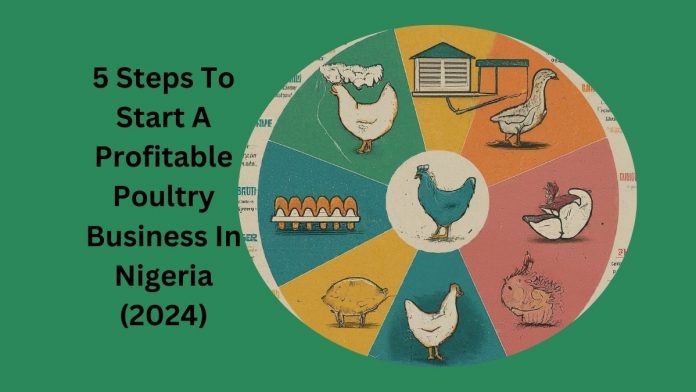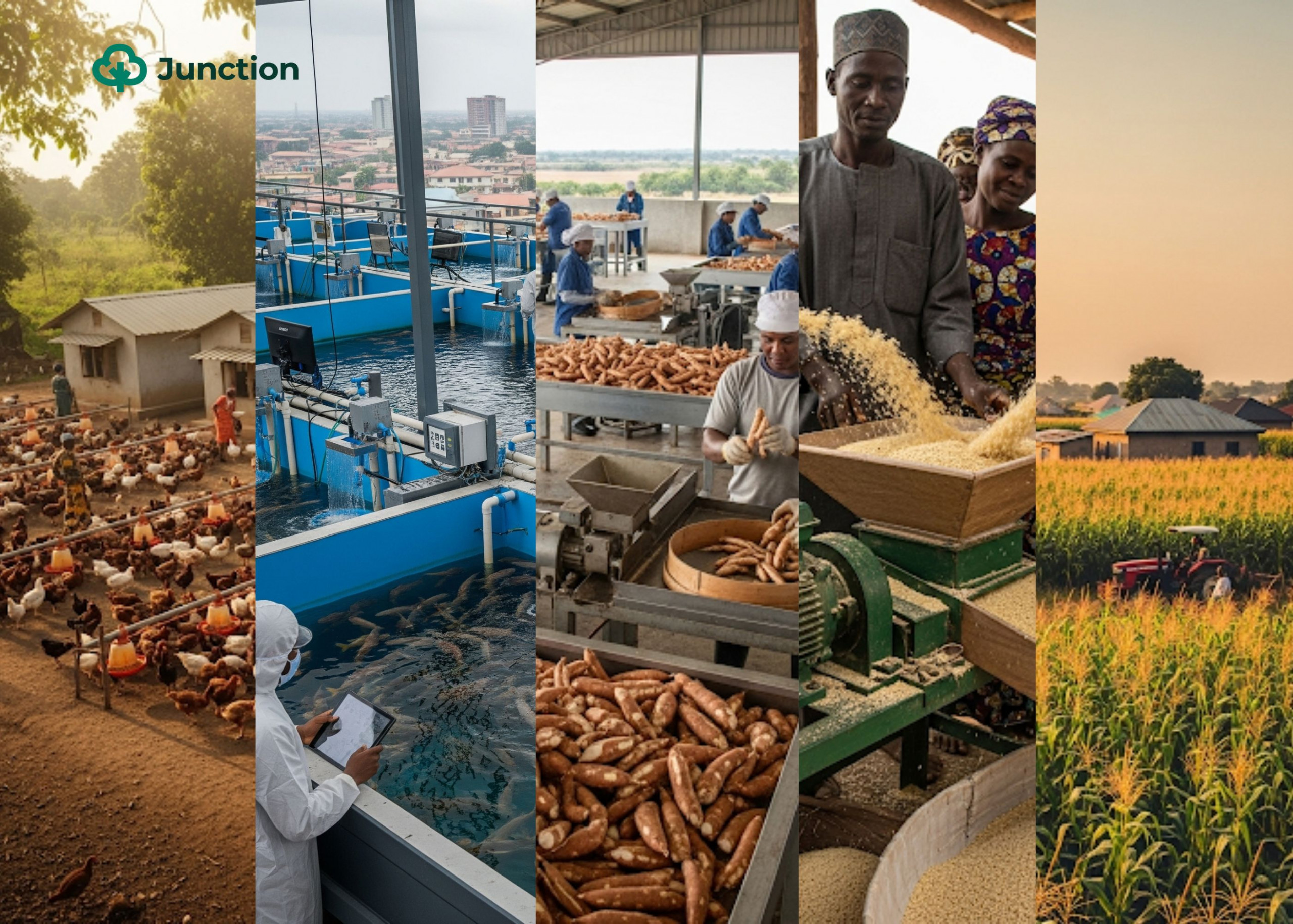Questions answered in this article:
– What are the different types of poultry farming in Nigeria, and what are the pros and cons of each type?
– What are the challenges of poultry farming in Nigeria, and how can you be successful as a poultry farmer in Nigeria?
Poultry farming, in general, is the practice of raising domesticated birds, such as chickens, ducks, turkeys, and geese, for meat, eggs, and feathers. It involves breeding, raising, and caring for birds in controlled environments.
Behind beef and goat meat (or mutton), poultry meat is the most consumed kind of meat in Nigeria. It also produces eggs, which are in high demand because not all households can afford meat. There is a gap between production and demand for these products, creating entrance opportunities for more producers.
For example, in 2023, Nigeriaâs minister of agriculture and food security, Abubakar Kyari, mentioned that the countryâs annual consumption of eggs was 14 billion while the production capacity was 10.3 billion. Thus, this leaves a gap of 3.7 billion eggs! He also stated that poultry meat production output only satisfied 55% of the 1.5 million metric tonnes (MMT) consumption demand.

This deficit is being met through smuggling activities as live or frozen poultry and eggs are prohibited import items.Â
Thus, the market for affordable poultry products in Nigeria exists. To own a fair share of these consumers, you must better current market prices or match them while staying profitable.
5 steps to start a poultry business in Nigeria (2024)
Like any money-making venture, starting a poultry farming requires a well-detailed business plan, especially if it is a commercial one. Subsistence farmers runing a small farm at home, raising a few birds (less than 20), may do so without giving much thought to things like economics of production, risk assessments, return on investments, and profitability. However, if you are entering it to make money, you will need these five basic steps:
Step 1 âType of poultry bird selection
To start a poultry farm, you must choose a bird and breed type to focus on if you want to run a lean operation. While making your choice, you have to consider which bird or breed fits your purpose of starting the poultry farm and their adaptability to the environment where your farm is located. Also, how available are the resources you need and market demand for the products? You may need to consider government regulations concerning the bird or breed and financial implications (initial costs and return on investments).

In Nigeria, chicken eggs and meat are the most common types of poultry products because of higher demand due to cultural preference and profitability. They also typically have a higher growth rate than ducks, turkeys, guinea fowls, and geese, allowing for quicker turnover and more frequent production cycles. Despite chickensâ dominance and popularity, some Nigerian poultry farmers engage in the production of other birds.
For chickens, here are some major Nigerian breeds and the purposes they serve:
- Broilers are chickens raised for meat production. They are typically fast-growing and have a high meat yield, making them suitable for the meat industry.
- Layers are primarily raised for egg production. They are known for their high egg-laying capabilities and efficient feed conversion.
- Cockerels are local chickens often raised for both meat and egg production. These indigenous breeds are well-adapted to local conditions but have lower productivity compared to the two breeds mentioned above.
Step 2 âChoose a suitable location
Poultry breeds are delicate in the early stages of production, with most mortality expected to happen within the first seven days or a few weeks. Causes of death can range from cold to diseases, making it crucial to carefully select a suitable location to raise your birds.Â
Avoid overcrowded areas that are not too cold or hot. This is important even when you plan to construct a conducive structure to house the birds, as there is only so much you can control about the weather or environment. Additionally, investigate to be aware of flooding patterns, thieves, pests, and more associated with the area.Â
Accessibility is another consideration when choosing a location. You should ensure that you can easily get inputs to your farm for production and get products to the market when it is time to sell. Hindrances either way can endanger your ventureâs profitability.
Step 3 âSet up housing and shelter for poultry birds
After choosing an appropriate location that considers the many risks associated with starting a profitable poultry farm in Nigeria, the next thing is to set up a housing unit for the birds. You can opt for the following housing systems and design to suit your needs.
- Free-range poultry housing system: In this kind of housing system, the birds are free to roam about instead of spending their days confined to cages or small, restrictive housing units. While it is typical of traditional ways of rearing poultry, many developed parts of the world are also actively seeking products from birds raised in this way as they consider it more humane. Also, financially, it suits smallholder farmers raising cockerels more because they will spend less on feeding the birds, which are free to forage for their own food, but they will still need to provide shelter for the night and from periodic extreme heat or rain. This system is complicated for large-scale poultry production because it will require the farmer to have large amounts of land for the birds to roam free. Additionally, the farmer will have lesser control over the birdsâ nutrition, which will impact when they mature and are ready for egg production or slaughter. There are also dangers of disease infestation and birds becoming prey to predators.
- Semi-intensive housing system: This system works best for farmers looking to balance increased production efficiency and the desire to provide birds with a more natural environment. It involves providing outdoor access to the birds and space for natural behaviours while confining them periodically (like during feeding, medication, periods of extreme weather, and egg laying). This housing system is desirable to consumers that seek free-range birds and still meets production demands associated with large-scale production. The farmer can stock more birds with lesser land holding, but it may be more financially demanding.
- Intensive housing system (also factory farming): To closely monitor temperature, lighting, ventilation, and feed for poultry, an intensive farming system is encouraged. Using this type of housing, farmers can stock a large number of birds with even less land space than the earlier-mentioned systems. Also, the farmer can control disease infestation by carefully monitoring contact with the outside world and through routine quarantine and vaccination programs. The farmer can efficiently collect eggs with facilities like egg roll-out systems, collection trays, belts or conveyors. However, there are some reports that keeping birds in enclosed spaces for prolonged periods contributes to the rise in bird flu cases. One major drawback of this system is the growing dislike among customers who prefer organically produced eggs (like in free range). It is associated with animal cruelty, and there are several debates over the nutritional value of factory (intensive system) produced eggs and farm fresh (free range system) eggs.

When choosing which poultry housing system to use in Nigeria, consider the factors highlighted here, such as cost, production efficiency, resources, target market, government and environmental laws, and more.
Step 4 âSet up feeding and medication routine
To run a profitable poultry farm in Nigeria in 2024, you must take feeding and medicating birds seriously. Factors like the type of poultry (broilers, layers, or cockerels), the age of the birds, specific health considerations, and the production goals should determine the routine and schedule you set up.
If you are a new farmer just starting this kind of venture for the first time, you should dedicate time to speaking to experts in the industry to ensure that you get this step correctly. An agronomist associated with Nigerian agritech startup AgroMall revealed that the majority of bird mortality caused by diseases could have been avoided by proper medication. He mentioned that diseases like Newcastle disease and Gumboro, which affect about 43% of poultry birds, can be easily prevented with medication and vaccination routines. Put biosecurity measures in place, like controlling the number of visitors to your farm, sanitising equipment, and practising good hygiene to avoid introducing diseases to the birds. These measures are easier to set up and maintain in intensive systems. Also, have a veterinarian on call for assistance when needed.
Another important consideration during this step is to avoid manipulating feed outside of a proper formula, which some do to save cost. The best industry practice is to stick to the feeding formula and add the additional cost to the market price of the products when you are ready to sell. Reducing feed to save cost will only increase how long it will take to attain weight target (in broilers) and egg output (in layers). This factor is one of the reasons why eggs are getting more expensive in Nigeria in 2024. The price of maize and soybean (major components of poultry feeds) are rising, and producers are raising market prices to offset the increased cost of inputs.
Step 5 âMarketing and selling poultry products in Nigeria
Marketing and sales are the final and crucial steps in running a profitable poultry farm or farming venture. The price you set for products must balance out the entire operational costs and leave you with profit. Otherwise, you run the risk of closing down your poultry farm after one production cycle.
A well-run commercial poultry farm should ideally have a return on investment (ROI) of about 100%, according to industry analysts, if there are no major negative market movements during production. It is expected to be slightly lower in cases where input prices spike unexpectedly.
A farmer has to take all these into consideration when setting prices. Another contributor to pricing decisions is what competitors are selling, which is why you must ensure that your operational cost is not higher than other producers.
To ensure that you sell in bulk, you may consider partnering with an off-taker from the beginning of your venture. An offtaker is usually a company or an organisation that needs the produce in large quantities. Agreement with this kind of party can help farmers fix prices, and provide a stable market and access to finance by improving credibility.
Smallholder farmers, who may not meet the requirements to enter off-taker agreements, can collaborate with other farmers of similar strength to reach the required limits. Otherwise, they can partner with retailers like shop owners. They can also leverage the power of the internet by marketing their products online, like on social media and online marketplaces.

Succeeding as a poultry farmer in Nigeria
Gather as much knowledge as possible before you begin your poultry business. You can buy online courses, attend lectures and seminars, read books and blog posts, and more. Consult with experts and it does not hurt to have a more experienced farmer overseeing your activities at the beginning or visiting periodically.
The challenges plaguing business owners in Nigeria are numerous, and they are increasing. From fuel price hikes to rising input costs and general inflation, it is impossible not to encounter problems. To succeed as a poultry farmer in Nigeria and make a profit it is vital to be flexible. In addition, set aside some funds for contingency and emergencies. Stay up to date with industry happenings by subscribing to our newsletter.




I appreciate your lecture,I am very interested in poultry farming business in Nigeria.
I desire to start poultry business.
And were can buy broiler?
[…] Steps to Start a Poultry Farm in Nigeria […]